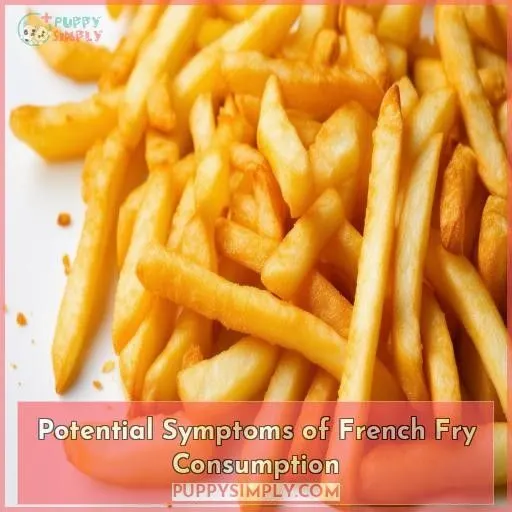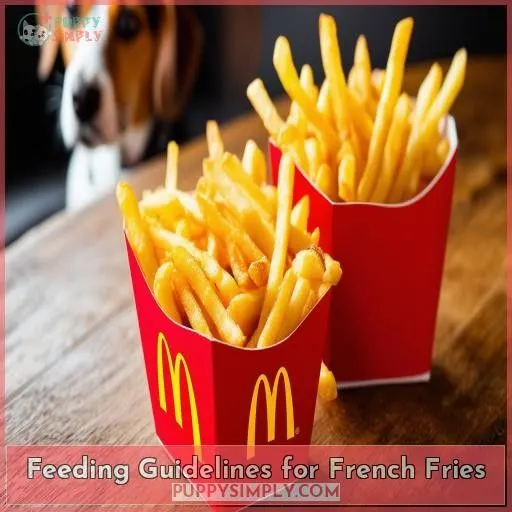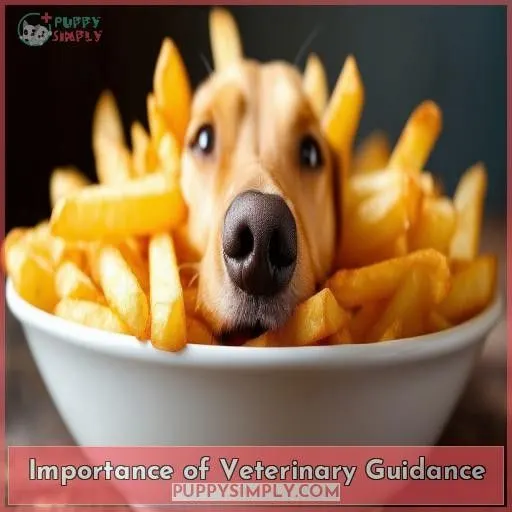This site is supported by our readers. We may earn a commission, at no cost to you, if you purchase through links.
 Feeding your dog McDonald’s French fries isn’t a great idea. They’re high in fat, calories, and salt, which can lead to serious issues like pancreatitis, obesity, and salt poisoning .
Feeding your dog McDonald’s French fries isn’t a great idea. They’re high in fat, calories, and salt, which can lead to serious issues like pancreatitis, obesity, and salt poisoning .
Symptoms to watch out for include vomiting, diarrhea, and increased thirst .
If you want to give your pup a treat, choose healthier options like sweet potato fries, apple slices, or carrot sticks. Always consult your vet** before sharing human food with your dog to avoid unexpected health issues—it’s the smart move for any pet parent. Curious to know more
Table Of Contents
- Key Takeaways
- Can Dogs Eat Mcdonald’s French Fries?
- Health Risks of French Fries for Dogs
- Potential Symptoms of French Fry Consumption
- Feeding Guidelines for French Fries
- Safer Alternatives to French Fries
- Other Dangers to Consider
- Importance of Veterinary Guidance
- Frequently Asked Questions (FAQs)
- Conclusion
Key Takeaways
- Don’t be a fry-day offender! McDonald’s fries are a no-go for your furry friend, loaded with fat and salt that could land them in doggy jail (the vet’s office).
- Pancreatitis party pooper: Those fatty fries can trigger a painful party in your pup’s pancreas, leaving them feeling under the weather.
- Obesity on the horizon: Regular fry fests can pile on the pounds, making your pooch a candidate for the doggie weight-loss club.
- Dehydration drama: The high salt content in fries can leave your dog feeling parched and thirsty, like a fish out of water.
Can Dogs Eat Mcdonald’s French Fries?
No, dogs shouldn’t eat McDonald’s French fries, as they’re high in fat, calories, and salt, which can cause health issues like pancreatitis and dehydration . If your dog consumes French fries, they might experience symptoms like vomiting and diarrhea, so it’s best to consult a vet (Source).
Health Risks of French Fries for Dogs
While McDonald’s french fries may seem like a tasty treat for your pup, they’re extremely high in fat and calories, putting your dog at risk for pancreatitis and obesity. The excessive salt content can also lead to dehydration or even salt poisoning, especially if your furry friend consumes a large portion.
High in Fat and Calories
A typical order of McDonald’s fries is loaded with unhealthy fats and calories that dogs simply can’t digest properly. You’re putting your pup at risk for digestive upset, pancreatitis, obesity, and even toxic salt poisoning by sharing those fatty, salty treats. No matter how much they beg, it’s best to avoid giving fries to dogs entirely.
May Cause Pancreatitis
French fries also increase your dog’s risk of pancreatitis—a painful inflammation of the pancreas. The high fat content can trigger this condition, with symptoms like:
- Vomiting
- Abdominal pain
- Loss of appetite
To prevent pancreatitis, limit fatty treats like fries. If symptoms arise, seek veterinary care immediately as pancreatitis requires prompt treatment.
Can Lead to Obesity
You should be mindful of the long-term effects of feeding French fries to your dog.
The high-fat and calorie content can quickly lead to obesity, especially in smaller breeds or dogs prone to weight gain.
Coupled with the risk of pancreatitis, regularly indulging your pup with fries can put a strain on their digestive enzymes and overall health.
Portion control and moderation are key regarding human food treats for pets.
Potential for Salt Poisoning or Dehydration
While McDonald’s fries aren’t toxic for dogs, their high salt content raises concerns:
- Excess salt intake risks salt poisoning, especially for smaller breeds.
- Dehydration risk increases, so monitoring water intake is essential.
- Dogs have varying salt tolerances based on age, size, and health.
- Ingredients like onion powder can further irritate their digestive system.
Ensure water availability and moderate portion sizes to prevent issues like vomiting, diarrhea, and excessive thirst.
Potential Symptoms of French Fry Consumption
If your dog consumes a significant amount of McDonald’s french fries, there’s a possibility of vomiting, either a single episode or persistent vomiting over several hours. Additionally, you may notice diarrhea or increased thirst due to the high salt content in the fries.
Vomiting (single Episode or Persistent)
After consuming McDonald’s fries, you may notice your pup vomiting. A single episode is typically not cause for alarm, but persistent vomiting over 4-6 hours warrants veterinary attention. Pay close attention to the vomit’s color, content, and odor, as these can indicate the severity of the issue.
| Vomit Characteristic | Potential Concern |
|---|---|
| Yellow/Green | Bile |
| Blood | Ulcers/Irritation |
| Foul Odor | Infection |
| Undigested Food | Blockage |
Diarrhea
Another potential symptom you may notice after your dog consumes McDonald’s fries is diarrhea. This can occur due to:
- High fat and salt content irritating the digestive system
- Potential dehydration from excess salt intake
- Risk of pancreatitis from the high-fat meal
If diarrhea persists for more than 24 hours or is accompanied by other concerning signs, contact your veterinarian immediately.
Increased Thirst
You’ll also want to watch for increased thirst as McDonald’s fries contain quite a bit of salt. While not a major concern for a dog Leo’s size, the high salt content can disrupt his electrolyte balance, leading to dehydration. Monitor his water consumption closely and offer fresh water frequently after he’s indulged in fries.
Feeding Guidelines for French Fries
Regarding feeding your dog McDonald’s french fries, moderation is essential. Unseasoned fries can be given as an occasional treat, limited to one or two fries a few times a week, and carefully monitoring your pet for any adverse reactions.
Plain Fries Without Seasoning
Regarding the topic of feeding your pup French fries, opt for plain ones without any seasoning or toppings. These added ingredients can trigger allergic reactions, digestive upset, or even pose a choking hazard. Although the occasional unseasoned fry isn’t toxic, their high fat and sodium content can still lead to weight gain or dehydration.
Limit to 1-2 Fries a Few Times a Week
While plain fries can be an occasional treat for your pup, it’s essential to restrict their intake to:
- 1-2 fries
- A few times a week
- As part of a balanced diet
Excessive fry consumption can trigger pancreatitis, obesity, and dehydration. By moderating portions and frequency, you’ll prevent potential allergies and health issues while still allowing your furry friend to indulge now and then.
Monitor for Any Adverse Reactions
While an occasional plain french fry is usually fine, you’ll want to monitor your pup closely for any adverse reactions. Keep an eye out for signs of digestive upset, dehydration, or allergic reactions like vomiting, diarrhea, or excessive thirst. If you notice anything concerning, consult your vet immediately.
| Potential Risks | Signs to Watch For |
|---|---|
| Allergic Reaction | Vomiting, Diarrhea, Itching |
| Digestive Upset | Stomach Pain, Gas, Bloating |
| Salt Poisoning | Excessive Thirst, Lethargy |
Safer Alternatives to French Fries
While McDonald’s french fries may seem tempting as a treat for your furry friend, it’s essential to explore healthier alternatives that provide essential nutrients without compromising their well-being. Consider offering your dog sweet potato fries, apple slices, banana chips, carrot sticks, or green beans as safer, nutritious options that can satisfy their cravings while promoting excellent health.
Sweet Potato Fries
Sweet potato fries make a delicious and nourishing alternative. You can:
- Bake homemade sweet potato fries in the oven for a healthier option.
- Air fry them for a crispy texture with less oil.
- Top with tasty dips like plain yogurt or peanut butter.
Packed with vitamins and fiber, sweet potatoes provide valuable nutrition for your furry friend.
Apple Slices
And what about apple slices? They’re a nutritious, low-calorie treat your pup will likely gobble up. Packed with fiber, vitamins, and antioxidants, apples offer a crunchy snack without the risks of french fries. Just be mindful of any potential allergies and remove the seeds and core before serving slices from your fresh-picked apple orchard bounty.
Banana Chips
You can also opt for banana chips as a healthier alternative to french fries. They offer:
- A crunchy texture dogs enjoy
- Essential vitamins and minerals
- Fiber for digestive health
- Low-calorie treat option
Banana chips make tasty, nutritious homemade treats that support your pup’s dental health and overall well-being.
Carrot Sticks
Another healthy alternative are carrot sticks. They’re low in calories yet packed with dietary fiber, vitamins, and minerals that boost overall health. Crunchy carrots also promote dental health by gently scraping plaque off teeth as your pup chews. Plus, their satisfying crunch helps with weight management by curbing cravings for unhealthy snacks.
Green Beans
Green beans? A safe, nutritious alternative to fries! Their high fiber content and low calorie count make them a great doggy treat. You can even share some from your plate when eating human food – just be mindful of the serving size. Green beans offer digestive benefits and a guilt-free snack for your furry friend.
Other Dangers to Consider
While french fries may seem like a harmless treat, you should also be wary of potential choking hazards, especially with smaller dogs or overly enthusiastic eaters. Additionally, the various ingredients and cooking methods used in fast food french fries can sometimes lead to digestive issues like vomiting or diarrhea in dogs.
Choking Hazard
When feeding dogs French fries, consider the choking risk. Pieces can be too large, blocking the airway. Additionally, dogs can have a potato allergy causing digestive upset. Excessive salt leads to dehydration and salt poisoning. Always supervise, give small pieces, and make sure water is available. Your pet’s safety is paramount.
Harmful Ingredients
French fries contain harmful ingredients for pets, like trans fats and toxic seasonings. Trans fats can lead to serious health issues, including heart disease and obesity. Toxic seasonings, such as garlic and onion powders, are dangerous and can cause serious harm. Always make certain fries are plain and free from these harmful additives to protect your pets.
Digestive Issues
When your dog consumes McDonald’s fries, digestive issues could surface. These fries are high in fat and seasonings, potentially leading to:
- Stomach upsets: Results can include vomiting or diarrhea.
- Pancreatitis risk: High-fat content may trigger this painful condition.
- Salt poisoning: Excessive salt can cause dehydration and increased thirst.
Always monitor for symptoms and consult your vet.
Importance of Veterinary Guidance
When introducing new foods like McDonald’s French fries, always consult your vet to avoid health risks and monitor your pet for adverse reactions. Make sure your dog has access to water after consumption, and consider pet insurance to cover unexpected veterinary costs.
Always Consult a Vet Before Introducing New Foods
Changing to new foods can be hazardous, as it may lead to adverse health outcomes for your pet. It’s important to seek veterinary approval to prevent complications like pancreatitis or obesity. Regular consultations with your veterinarian guarantee that you’re aware of the specific needs and tolerances of your pet, minimizing risks and protecting their well-being (Source).
Monitor Pets While Eating
Monitoring your dog while they eat is essential to catch any allergic reactions, choke risks, or signs of stomach upset. This vigilance helps prevent potential weight gain and pancreatitis, common with high-fat foods like French fries. Keep an eye out for symptoms such as increased thirst or unusual behavior, indicating a possible issue needing vet attention.
Ensure Access to Water After Consumption
Ensuring access to water after consuming salty foods like McDonald’s fries is essential. High salt intake can cause dehydration. To prevent this:
- Offer fresh water immediately to help flush out excess salt.
- Monitor for signs of dehydration, such as excessive thirst or lethargy.
- Consult your vet if symptoms persist.
Consider Pet Insurance for Unexpected Vet Costs
Consider pet insurance to manage unexpected costs from veterinary visits. Insurance coverage helps with sudden illnesses or accidents, ensuring your pet’s health isn’t compromised by financial strain. This preparedness offers peace of mind, knowing you can handle veterinary expenses without worry. Prioritize your pet’s well-being and avoid unexpected bills with reliable pet insurance coverage .
Frequently Asked Questions (FAQs)
Is it okay to feed dogs french fries?
It’s not advisable to feed dogs French fries due to high fat, salt, and potential for causing pancreatitis, obesity, or dehydration. Always consult your vet before introducing new foods to your dog’s diet .
Can dogs eat McDonald’s nuggets?
Feeding your dog McDonald’s chicken nuggets isn’t advisable due to their high fat, salt, and preservatives. These elements can cause obesity, pancreatitis, and digestive issues for dogs .
Can dogs eat cheeseburgers?
Dogs shouldn’t eat cheeseburgers due to high fat, salt content, and potential harmful ingredients like onions. Even though small amounts may not be immediately dangerous, it’s best to avoid sharing them to keep your dog healthy .
Can dogs have potatoes?
Yes, dogs can eat potatoes, but they should be cooked and plain, without seasoning or additives. Always avoid giving your dog raw potatoes, as they contain solanine, which can be toxic to dogs (Source).
Are McDonalds fries toxic to dogs?
McDonald’s fries aren’t toxic to dogs, but they’re not safe either. They contain high fat and salt, which can lead to obesity, pancreatitis, and dehydration. Monitor Leo closely if he consumes them .
What are natural alternatives to fries?
You can offer natural alternatives like sweet potato fries, apple slices, banana chips, carrot sticks, or green beans to your pets. These options are healthier and avoid the risks associated with regular French fries .
How can I make fries pet-safe?
To make fries pet-safe, bake thinly sliced sweet potatoes without seasoning. Avoid adding salt, garlic, or onion. This makes a healthy alternative to traditional French fries, ensuring your pet’s safety while they enjoy a tasty snack.
Why is salt dangerous for pets?
Salt is dangerous for pets because it can lead to dehydration, increased thirst, and sodium ion poisoning, which can cause vomiting, diarrhea, tremors, seizures, and even death if consumed in large amounts .
Conclusion
Ultimately, feeding your dog McDonald’s French fries is the wrong move. These fries are high in fat and salt, posing significant health risks like pancreatitis, obesity, and salt poisoning. Watch for symptoms like vomiting and increased thirst.
Healthier alternatives like sweet potato fries offer safer options. Always consult your veterinarian before sharing any human food with your dog to guarantee their safety and well-being. Prioritize your dog’s health to avoid unnecessary vet visits.












